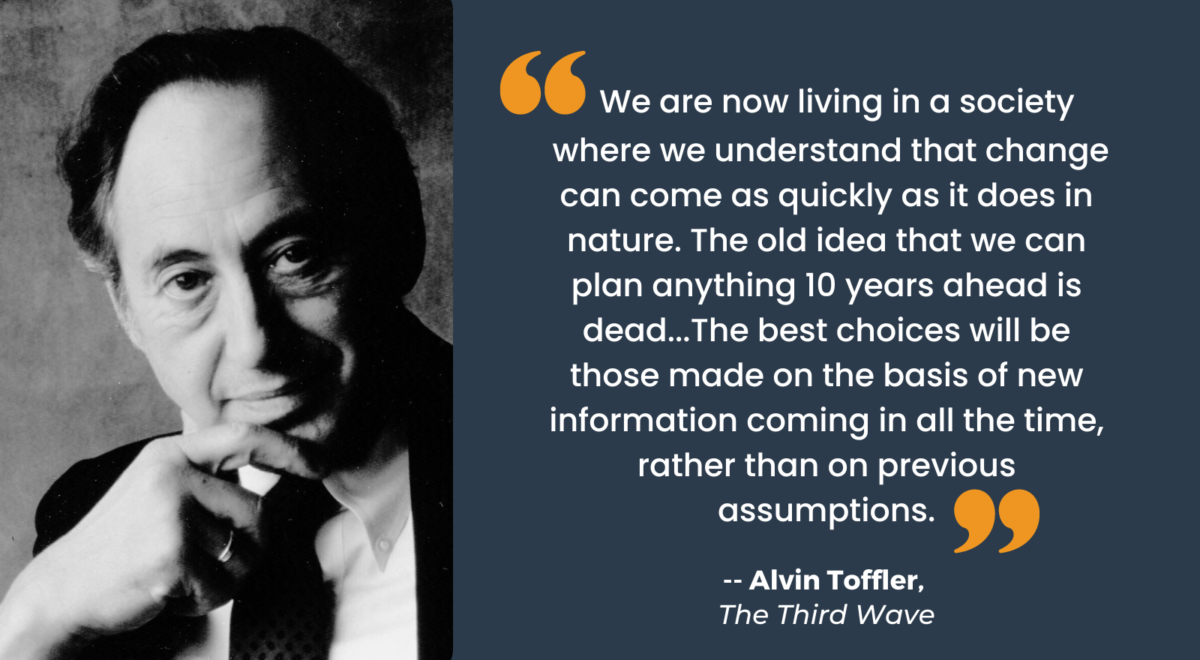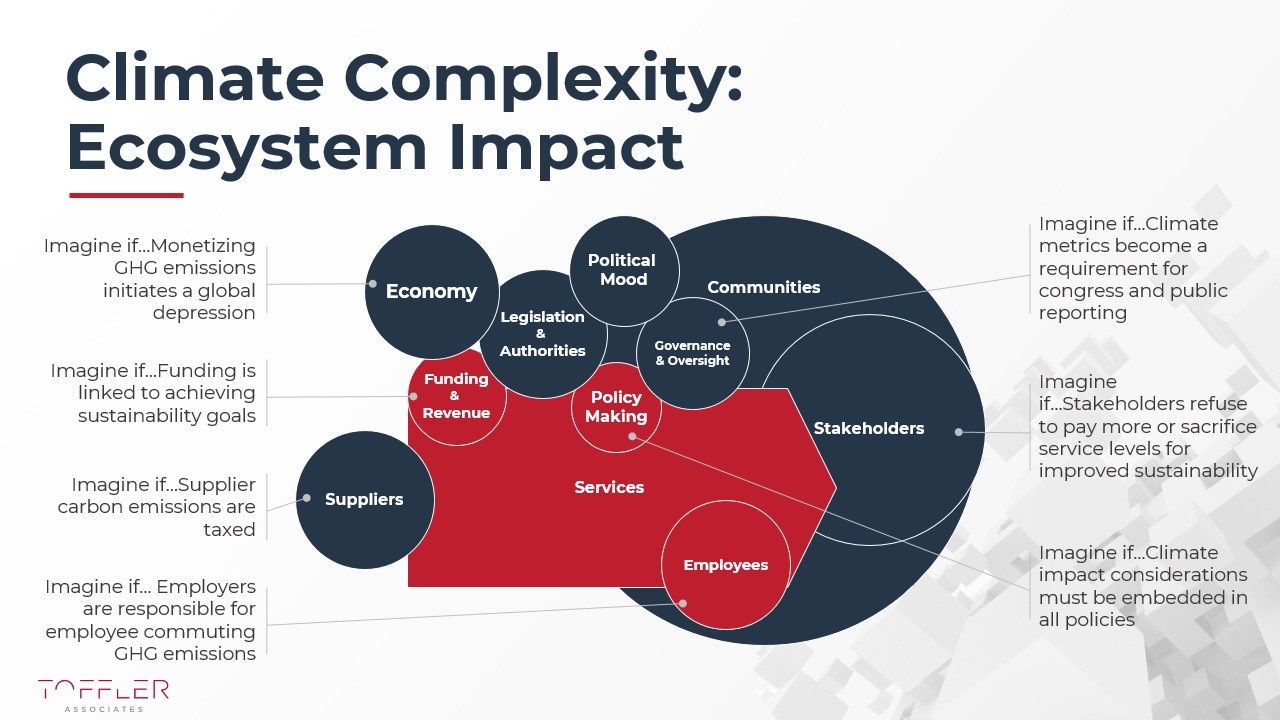Tabletop Exercises: Assessing Risk and Identifying Opportunities

In my work with executive leaders and corporate boards, I’ve noticed they often face a significant challenge in bridging the gap between their experience and expertise and their ability to effectively advise leaders on emerging risks and opportunities. This discrepancy becomes particularly evident when dealing with new and unfamiliar risks, such as climate change, disruptive technology like artificial intelligence, cyber, and demographic shifts.
The National Association of Corporate Directors (NACD) has recognized this trend, as indicated in their recent report, A Framework for Governing into the Future. The report highlights that approximately one-third of respondents feel their boards lack the capacity and expertise to oversee critical areas like cybersecurity and geopolitical risk. 41% indicate their board lacks the capacity and expertise to address climate risk. To navigate these complexities, a transformative approach is needed to empower boards to govern in uncertain times and enable them to embrace a broader range of stakeholders’ interests.
The Expanding Scope of Risks and Stakeholders
The scope and scale of emerging risks have far-reaching implications across organizational ecosystems, necessitating an expanded focus on corporate stakeholders. The NACD report emphasizes that companies and their investors increasingly recognize that shareholder value is not created in isolation. The interests of customers, employees, suppliers and communities play a crucial role in driving long-term growth.
Today’s society expects companies not only to excel financially but also to make positive contributions to society and with great transparency. In this context, corporate boards are faced with the challenge of governing for the long-term health and sustainability of their organizations while considering a diverse stakeholder ecosystem including shareholders, customers’ customers, suppliers’ suppliers, regulators, industry associations, and the broader communities in which they operate.
Exploring Risks and Uncertainties
To effectively address risks, both immediate and long-term, corporate boards and executive leadership teams must adopt proactive approaches. They need to incorporate foresight analysis and continuously seek to understand future uncertainties. This is where futures scenario exercises and tabletop exercises prove invaluable. By engaging executive teams and boards in these exercises, organizations gain an ongoing learning process that stimulates critical thinking and prepares decision-makers for potential disruptions.
Toffler Associates has conducted over 500 exercises, including Flash Futures Scenario Exercises, War Games, Imaginative Gaming, and Tabletop Exercises, to address a wide range of concerns, such as climate change, technological disruption, innovation, security risks, and workforce transformation. These exercises are not intended for forecasting or probabilistic models. They push participants to explore possible and plausible outcomes and encourage them to think innovatively.
The Objectives and Value of Tabletop Exercises
The primary objective of tabletop exercises is to explore potential disruptions, understand their cascading consequences, and develop an understanding of the key elements required for making future-ready decisions. These exercises hold immense value for boards and executive leadership teams by building resilience, providing learning opportunities on emerging topics such as AI and climate, and fostering the practice of handling tough decisions and determining appropriate actions. Tabletop exercises simulate future scenarios, allowing leaders to envision the impact of their decisions within dynamic contexts. At Toffler Associates, we specialize in creating vivid depictions of future worlds, complete with timelines, descriptions of relevant “day-in-the-life” scenarios, and multimedia content to enhance understanding and engagement.
By intentionally pushing leaders out of their comfort zones, these exercises encourage participants to analyze issues from various perspectives and improve their communication and decision-making abilities. Tabletop exercises facilitate collaboration among decision-makers who may not usually focus on the actions of their counterparts or seek to understand a different functional or operational division. Through these exercises, participants gain insights into their colleagues’ reactions and the factors influencing those reactions, leading to a better understanding of the interplay between stakeholders and practice for actual future decisions when stakes are high.
Integrating Tabletop Exercises into Board and Senior Leader Meetings
To maximize the impact of tabletop exercises, we recommend integrating them into regular board or senior leader meetings. A shorter, two-hour exercise can be conducted during quarterly meetings to delve deeper into specific topics, elevating the understanding of leaders across the organization. Alternatively, longer scenario-based tabletop exercises can be held semi-annually to promote active learning and engagement while building resiliency among decision-makers.
The 5 Macro Forces of Future Disruptions
At Toffler Associates, we have dedicated ourselves to continuous research on future disruptions, understanding that uncertainties arise from various macro forces that influence the business landscape. These forces transcend industry boundaries and often manifest in the spaces between sectors, creating opportunities for innovation and posing new threats. The following five macro forces shape the way people live, work, travel, trust, vacation, stay healthy, socialize, and transact:
1. Societal Coalitions and Collisions
The increasing interconnectedness of our world through global connectivity has given rise to new relationships and interactions among diverse societal groups. As beliefs and expectations shift, clashes with traditional shared assumptions and social norms become more prevalent. This force disrupts established patterns and demands that organizations navigate the complexities of societal coalitions and collisions, understanding the evolving dynamics of stakeholder relationships and finding ways to align diverse interests.
2. Bio-digital Convergence
The integration of pervasive technologies with human beings has ushered in an era of bio-digital convergence. This force has a profound impact on human performance, policies, data privacy, and ethics. As technology intertwines with our lives, organizations must grapple with the implications of this convergence. They must navigate the ethical considerations surrounding data privacy, harness the potential of emerging technologies responsibly, and adapt policies to accommodate the evolving human-machine relationship.
3. Powershifts
Power dynamics across political, economic, and human entities are undergoing significant shifts, transcending traditional boundaries and frameworks. This force disrupts established power structures, challenging governments, businesses, and societies to adapt and redefine their roles. Organizations must anticipate and respond to these powershifts, understanding the evolving landscape and seizing opportunities while managing the risks associated with changing power dynamics.
4. Infrastructure Adaptation
The convergence of physical, cyber, and human infrastructure gives rise to a smart, boundaryless, global “interstructure.” This force enhances efficiency and connectivity, but it also introduces friction between those who embrace or have access to this integration and those who do not. Organizations must navigate this complex landscape, ensuring they leverage the benefits of infrastructure adaptation while addressing the potential inequalities and challenges that may arise.
5. Climate Conflicts
The changes to Earth systems and the resulting impacts on society form the basis of this force. Climate change has far-reaching consequences, affecting ecosystems, economies, and social systems. Organizations must acknowledge the reality of climate change and its implications for their operations and stakeholders. It necessitates proactive efforts to mitigate environmental risks, adapt to changing conditions, and align business strategies with sustainable practices.
By recognizing and understanding these five macro forces, organizations can better prepare for future disruptions, uncover new opportunities, and navigate the complexities of an uncertain business landscape. Toffler Associates remains committed to researching and analyzing these forces, empowering organizations to thrive in a rapidly evolving world.
Toffler Associates’ Approach to Tabletop Exercises
Toffler Associates follows a systematic process when designing and conducting tabletop exercises, tailored to each organization’s unique needs and desired outcomes. This process includes the following steps:
1. Determine the goals and desired outcomes
Before designing any exercise, we collaborate with the client team to understand the significance of the event or topic for their organization and identify the expected impact on their business. This understanding serves as the foundation for setting clear objectives that participants must achieve to ensure success.
2. Develop an overarching scenario
The overarching scenario provides participants with a shared understanding of the environment in either the current or future timeframe. It outlines the prevailing threats, policy considerations, budgetary factors, international relations, and other conditions that will shape the specific fictional situations pertaining to rail security.
3. Design the game play
We harness the power of games to test hypotheses about strategic risks and immerse senior leaders in interactive environments. Games enable clients to identify potential risks and opportunities ahead of their competitors by considering future drivers of change, such as emerging technologies, climate implications, cyber and physical security, and the future workforce. We draw from existing playbooks or develop new ones based on requirements.
4. Conduct the exercise
The exercise itself allows participants to actively engage with the scenario, make decisions, and navigate through the challenges presented. The exercise may involve injecting new issues or information to test participants’ communication and decision-making abilities thoroughly.
5. Develop and conduct a “hotwash”
Following the exercise, we facilitate a “hotwash” briefing to review the most critical insights gained during the exercise. This reinforces the learnings and encourages further collaboration and communication among participants. The insights gained can then inform subsequent working group discussions and agendas, fostering an environment of continuous improvement.
Flash Futures in Action: Climate Complexity Scenario
To illustrate the effectiveness of tabletop exercises, let’s consider the example of climate complexity. Some firms execute tabletop exercises with simple scenarios only shifting temperatures. Considering temperature change checks off a compliance requirement but does not consider implications across the entire stakeholder ecosystem.
Toffler Associates explores broader scenarios that intersect with other future uncertainties, like regulations, labor, and politics. We develop scenarios based on robust research, facts, trends, and, most importantly, creative imaginations. The graphic below shows a slide from a recent Flash FuturesSM exercise, “imagining if…” with our client through different climate scenarios and their implications for their stakeholder ecosystem.

By taking into account relevant variables and considering the potential implications, executives and board teams can explore the potential risks and opportunities associated with climate change. These scenarios provide valuable insights for informed decision-making, enabling organizations to prepare for and mitigate the consequences of climate-related disruptions effectively.
Toffler Associates’ Path to Future-Ready Governance
Tabletop exercises serve as a valuable tool for organizations seeking to enhance their decision-making processes and understand the relationship between their strategic priorities. By engaging in these exercises, leaders gain a deeper understanding of the complexities of emerging risks and opportunities. Furthermore, tabletop exercises contribute to a corporate culture of innovation and resilience, driving overall organizational performance.
At Toffler Associates, our comprehensive approach to tabletop exercises empowers boards and senior leaders to face the challenges of an uncertain future confidently. By leveraging the power of scenario-based learning, organizations can position themselves as proactive and future-ready players in their respective industries.


 About the Authors
About the Authors